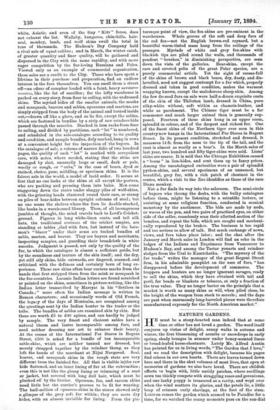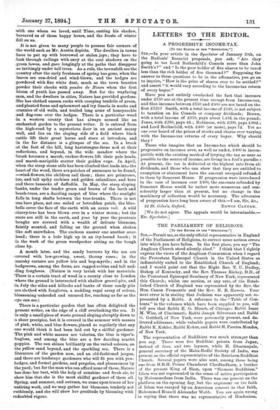NATURE'S GARDENS.
HE must be a stony-hearted man indeed that at some-
time or other has not loved a garden. The word itself conjures up vistas of delight, sunny walks in autumn and winter, the first blossoming of aconite or snowdrops in early spring, shady lounges in summer under honey-scented limes or broad-leafed horse-chestnuts. Lately Mr. Alfred Austin• has painted for us in living words, "The Garden that I love," and we read the description with delight, because his pages- find echoes in our own hearts. There are leaves turned down here and there in the shut volumes of most lives, that open at- memories of gardens we also have loved. There are childish efforts to begin with, little untidy patches, where seedlings sown too thickly compete with straggling roses and geraniums,. and one lanky poppy is treasured as a rarity, and wept over when the wind scatters its glories, and the petals lie, a little heap of crimson curly shavings, at the foot of the stem. Later on comes the garden which seemed to be Paradise for a. time, for we watched the sunny moments pass on the sun-dial with one whom we loved, until Time, casting his shadow, 'bereaved as of those happy hours, and the frosts of winter dell on us.
It is not given to many people to possess fair corners of the world such as Mr. Austin depicts. The dwellers in towns have to pat up with borrowed or stolen joys ; they have to 'look through railings with envy at the cool shadows on the :green lawns, and gaze longingly at the paths that disappear so invitingly under tall trees. As a rule, the townsfolk see the -country after the early freshness of spring has gone, when the leaves are am-dried and wind-blown, and the hedges are powdered with fine white dust, much as the town beauties powder their cheeks with poudre de _Ninon when the first -bloom of youth has passed away. But for the wayfaring men, and the dwellers in cities, Nature has provided gardens. 'She has clothed unseen rocks with creeping tendrils of green, and planted ferns and spleenwort and ivy linaria in nooks and crannies of old walls, and trailed long arms of honeysuckle and dog-rose over the hedges. There is a particular wood in a western county that has always seemed like an -enchanted garden to the present writer. It is entered from the high-road by a mysterious door in an ancient mossy wall, and lies on the sloping side of a field where black -cattle lift their great horns and stare at intruders, and in the far distance is a glimpse of the sea. In a brook .at the foot of the hill, long hartstongne-ferns nod at their reflections, and beyond, in the wide meadow where the brook becomes a marsh, cuckoo-flowers lift their pale heads, .-and marsh-marigolds scatter their golden caps. In April, -when the steep stone stile has been climbed that leads int, the 'heart of the wood, there are patches of anemones to be found, —wind-lowers, the children call them ; there are primroses, -too, and tall spiky orchises and golden celandines, and here -and there tussocks of daffodils. In May, the steep sloping 'banks, ander the tender green and brown of the larch and beech-trees, are a dazzling carpet of blue where the sunlight -falls in long shafts between the tree-trunks. There is not one bare place, not one soiled or betrodden patch, the blue- -bells cover the face of the earth with an azure veil. A wild 'cherry-tree has been blown over in a winter storm ; but the roots are still in the earth, and year by year the prostrate boughs are covered with a wealth of delicate blossoms, faintly scented, and falling on the ground when shaken like soft snowflakes. The cuckoos answer one another over- head.; there is a hole high up in an ivy-bound beech ; it -is the work of the green woodpecker sitting on the bough -close by.
A month later, and the sandy burrows by the sea are -covered with low-growing, sweet, thorny roses ; in the 'marshy corners are yellow iris and bog-myrtle ; and in the -hedgerows, among the ferns, are ragged-robins and tall nod- -ding foxgloves. (Nature is very lavish with her materials. 'There is a certain tract of wood in a county close to London -where the ground is intersected with shallow gravel-pits, and in July the sides and hillocks and banks of those sandy pits -are clothed with foxgloves, a nodding regal array of colour, -blossoming unheeded and uncared for, reaching as far as the 'eye can see.)
There is a particular garden that has often delighted the present writer, on the edge of a cliff overlooking the sea. It is only a small piece of waste ground sloping abruptly down to sheer precipice, but it is covered in the summer with masses of pink, white, and blue flowers, placed so regularly that any -one would think it had been laid out by a skilful gardener. 'The pink and white masses are valerian, the blue is viper's- tbugloes, and among the blue are a few dazzling scarlet poppies. The sun shines brilliantly on the varied colours, on 'the ydllow sand beyond, and the sparkling sea. There is a literature of the garden now, and an old-fashioned jargon, and there are landscape gardeners who will fit you with yew- hedges, and formal gardens, and pergolas, and pleasaunces by the yard.; but for the man who can afford none of these, Nature has-done her best, with the help of sunshine and fresh air, to chow him that she is the most skilful gardener of them all. Spring, and summer, and autumn, we come upon traces of her 'untiring work, and we may gather her blossoms, tenderly not ruthlessly, and-she will show her gratitude by blooming with redoubled vigour.



















































 Previous page
Previous page